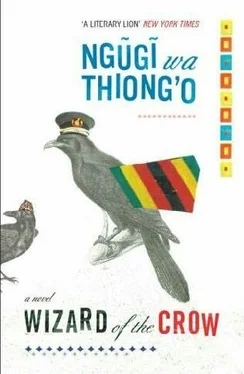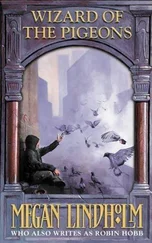I think about you day and night. Each day has had its pains, memories, and worries. I do not know whether you are alive, in the hands of the police, or dead, killed by thieves, though it is hard to distinguish between the police and thieves in our country. But what would a thief want with your bag, containing as it does only a beggar’s suit of rags? On the other hand, why would the police arrest you? What would they want from you? They say that desperate times call for desperate measures; the other night I even found myself wishing that I might bump into A.G., hoping that he would blab something about you. Then I remembered thatA.G. thinks that you and I are one; in his eyes, there is only one Wizard of the Crow, who can manifest himself in male or female form. No, A.G. cannot help me.
During Kamltl’s disappearance, it seemed to Nyawlra that her house was encased in unrelieved sepulchral silence. As she sat on the bed the first night, staring at nothing, she remembered that the nighttime queue outside her house would be starting up soon. What was she to tell these people? How would she send them away? The last thing she needed was a reminder of his absence. She decided to do what she thought Kamltl would have done were he in a similar predicament: use their fear of witchcraft to send them away. She wrote on cardboard: YOUR ENEMIES HAVE PLACED EVIL ON THESE GROUNDS TO ENSNARE YOU: I HAVE GONE TO GET CLEANSING POTIONS; DON’T BOTHER COMING BACK LOOKING FOR ME: I WILL PUT UP AN ADVERTISEMENT IN THE NEWSPAPER TO ANNOUNCE MY RETURN.-WIZARD OF THE CROW. She hung the board on the wall outside, shut the door, and put out the lights, preferring to move about the house in the darkness. She felt as if there were hundreds of eyes staring at her in the dark, and she felt safe only in bed.
Since parting with her husband, Nyawlra had gotten used to living alone. She hardly ever entertained in her house. Even her girlfriends from her days in school and college used to visit her more at her job than at home. Her two cousins were the only ones who came to see her at the house, but that was mostly on weekends. At first it was hard living in a house alone. But over time she came to enjoy and appreciate her freedom. She did not have to explain to anybody where she had been, how she had spent the day, or why she was late coming home. She had been answerable only to herself. Why, then, this sudden loneliness after the disappearance of someone she hardly knew?
Her makeshift sign had had the desired effect; later when she peered through the window she saw no shadows of men lingering in the streets. Over the next few days and nights, the unwanted visitors had dwindled to none. By the fourth day she took down the sign.
Completely preoccupied with Kamltl, Nyawlra would comb the papers for news of accidents or legal proceedings, at once hoping and fearing to find Kamltl’s name.
A thought crept into her mind. What if Kamltl was not what he had pretended to be but was actually a police agent sent to entrap her? Might this not explain Tajirika’s cryptic comments about movement members being her age-mates and finding themselves in trouble? Was Tajirika being sincere when he promised to introduce her to the Ruler? Her mind also raced with suspicions about Kaniürü’s presence at the Mars Cafe so early in the morning. But when she recalled Kamltl’s voice, face, and laughter, as well as his concern for others’ well-being, she calmed down.
Her second and third nights alone were made easier by having attended scheduled meetings of the movement. She had reported everything she knew about the plans for Marching to Heaven. She’d told them that the Ruler and his Minister for Foreign Affairs intended to take the Global Bank missionaries to where the queues were thickest and longest to prove that people were voting with their feet in support of Marching to Heaven. Most important, the government would soon select a day for the Ruler to dedicate the site for Marching to Heaven. At great length, they debated how to respond. Some suggested distributing more leaflets to expose the Ruler’s cynical plans and urge people to dismantle the queues as a means of thwarting the plans to exploit them. Others argued that since the queues were the result of high unemployment, there was no way the people would abandon them. Another course of action was debated: how to make use of the queues so as to steal the Ruler’s thunder.
Until now, the only free spaces in Aburlria were the churches and mosques and other authorized places of worship; liquor stores, bars, and other authorized alcohol consumption centers; and prison yards and police cells-wherever authority brandished its fearsome might, fearless of the words of unarmed inmates. The unemployment queues constituted such a site of democracy where gatherings did not require police permits. The movement decided that whenever they wanted to have a meeting, they would form a queue. They would use the queues for purposes of political mobilization.
Members decided that, come what may, they would disrupt the Ruler’s dedication as they had his birthday. On top of what she was already doing, gathering information on Marching to Heaven, Nyawlra had been further charged with gathering anything and everything about the government’s plans for the day of dedication.
Nyawlra welcomed these sessions and tasks, for they distracted her from her inner turmoil, her doubts regarding Kamltl. But as soon as she left the meetings, his many faces would invade her peace of mind with an intensity verging on vengeance. Yet she concluded that he was a man of wisdom and integrity whom the movement could usefully have recruited. But still, how could he have left without saying good-bye? How could she have trusted him?
Whenever she’d felt low in the past, Nyawlra had played her guitar. The sound of music from a guitar had acted as therapy after her car accident and after her divorce. Now she took it from the wall and tried picking the strings. But she felt as if the sounds were deepening instead of alleviating her sorrow. She hung it back on the wall.
Then suddenly anger seized her. What was it that had blinded her into believing that Kamltl was any different from any other male? I received him in my house and even gave him space for his witchcraft nonsense, and what does he do in gratitude? The anger gave her new energy. She must come to grips with herself.
On the fifth day she woke up, made some tea, and sat at the table. She did not even want to look at the couch, Kamltl’s bed. Nothing, no memory of laughter, was going to distract her from her resolve. She took out the letter she had written to him, and after reading it she calmly tore it into small pieces, some of which fell down to the floor by the legs of the table. Then she thought it better to burn all those pieces of paper so that the words would vanish forever, as if they had never been written or thought.
As she bent down to retrieve them, she noticed a note not in her handwriting. It was Kamltl’s hand. He had written her a letter and must have put it on the table. It had fallen, and she had failed to see it until now.
There was a time when the vast prairie surrounding Eldares was the domain of wild animals: rhinos, elephants, and hippos. In those days a traveler was likely to find leopards and lions lying in the grass, waiting for their prey among the grazing herds of zebras, dik-diks, duickers, bushbucks, gazelles, impalas, kudus, elands, warthogs, hartebeests, and buffalo. A most common sight was that of giraffes loping along or simply towering over the thorn-trees of the prairie. Occasionally an ostrich would scuttle across the prairie, and if a traveler was lucky he might find a newly laid ostrich egg inside a sand nest. But things had now changed. The wild animals had abandoned the prairie, leaving it to the emaciated cows and goats whose ribs protruded in times of drought when the grass completely dried up.
Читать дальше












